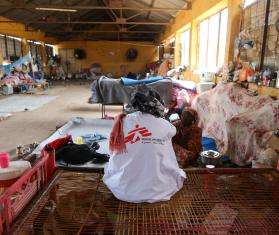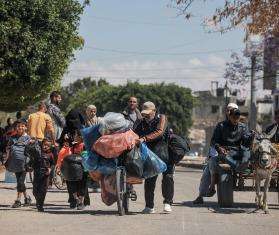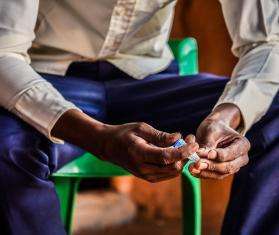ATHENS/NEW YORK, January 23, 2020—In Moria camp on the island of Lesbos, Greece is deliberately depriving at least 140 children of adequate medical care for chronic, complex, and life-threatening diseases, the international medical humanitarian organization Doctors Without Borders/Médecins Sans Frontières (MSF) said today, calling on the Greek government to evacuate all severely ill children for treatment on the Greek mainland or in other member states of the European Union.
"We see many children suffering from medical conditions such as diabetes, asthma, and heart disease who are forced to live in tents in abysmal, unhygienic conditions, with no access to the specialized medical care and medication they need," said Dr. Hilde Vochten, MSF medical coordinator in Greece. "MSF is in discussions with the Greek authorities to transfer children to the mainland for urgent medical care, but despite the fact that some children were screened, none have been transferred yet. The government's general unwillingness to find a swift, systematic solution for these children, including some babies, is outrageous—it harms their health and could lead to lifelong consequences or even death."

In July 2019, the Greek government revoked access to public health care for asylum seekers and undocumented people arriving in Greece. More than 55,000 people who have since arrived on the Greek islands now lack access to medical care.
Doctors in MSF's pediatric health center outside Moria camp regularly see children suffering from chronic and complex illnesses, such as heart disease, epilepsy, and diabetes, including at least 140 current patients. These children require specialized treatment, which the MSF health center is not equipped to provide. The local public hospital on Lesbos also cannot care for this many patients, and some specialized services are not available.
"My daughter, Zahra, is suffering from autism and we live a tiny space with almost no electricity," said Shamseyeh, a woman from Afghanistan, who lives in Moria camp. "Often in the middle of the night she has seizures and there is no one to help us. I just want to be in a space where my daughter can play like other children and be treated by a good doctor."
For the last four years, MSF has repeatedly denounced Moria camp as an inhumane consequence of government policies. A 2016 agreement between the European Union and Turkey—the so-called "EU-Turkey deal"—continues to create unnecessary suffering and put lives in danger, as migrants and asylum seekers are essentially trapped in grossly inadequate camps on Greek islands and denied basic services.
More than 19,000 people are now staying in Moria camp, which was initially built for 3,000.

"Children, women, and men are paying the unjust price of migration policies based on deterrence," said Tommaso Santo, MSF head of mission in Greece. "Denying health care to children suffering from serious diseases is just the latest cynical move, and it is truly beyond belief."
MSF calls for:
- The immediate evacuation from Lesbos of all people suffering from chronic and complex conditions, prioritizing children by establishing a system of regular transfers, to appropriate accommodation near providers of specialized medical care.
- The urgent and immediate provision of free, timely, and adequate health care for all asylum seekers, unaccompanied minors, and undocumented people in Greece.
- The end of the system of containment of refugees and asylum-seekers in horrific and inhumane conditions on Lesbos.
MSF has been providing medical and humanitarian assistance to asylum seekers and migrants in Greece since 1996. In 2014, MSF expanded its activities in Greece to meet the needs of an increasing number of asylum seekers, refugees, and other migrants arriving on the Greek islands and mainland from Turkey. Since 2016, MSF medical teams in Greece have provided services including basic health care, treatment for chronic diseases, sexual and reproductive health care, physiotherapy, clinical psychological care, and psychiatric care, along with a comprehensive social support package. Today, MSF teams work on the islands of Lesbos and Samos and in central Athens.




